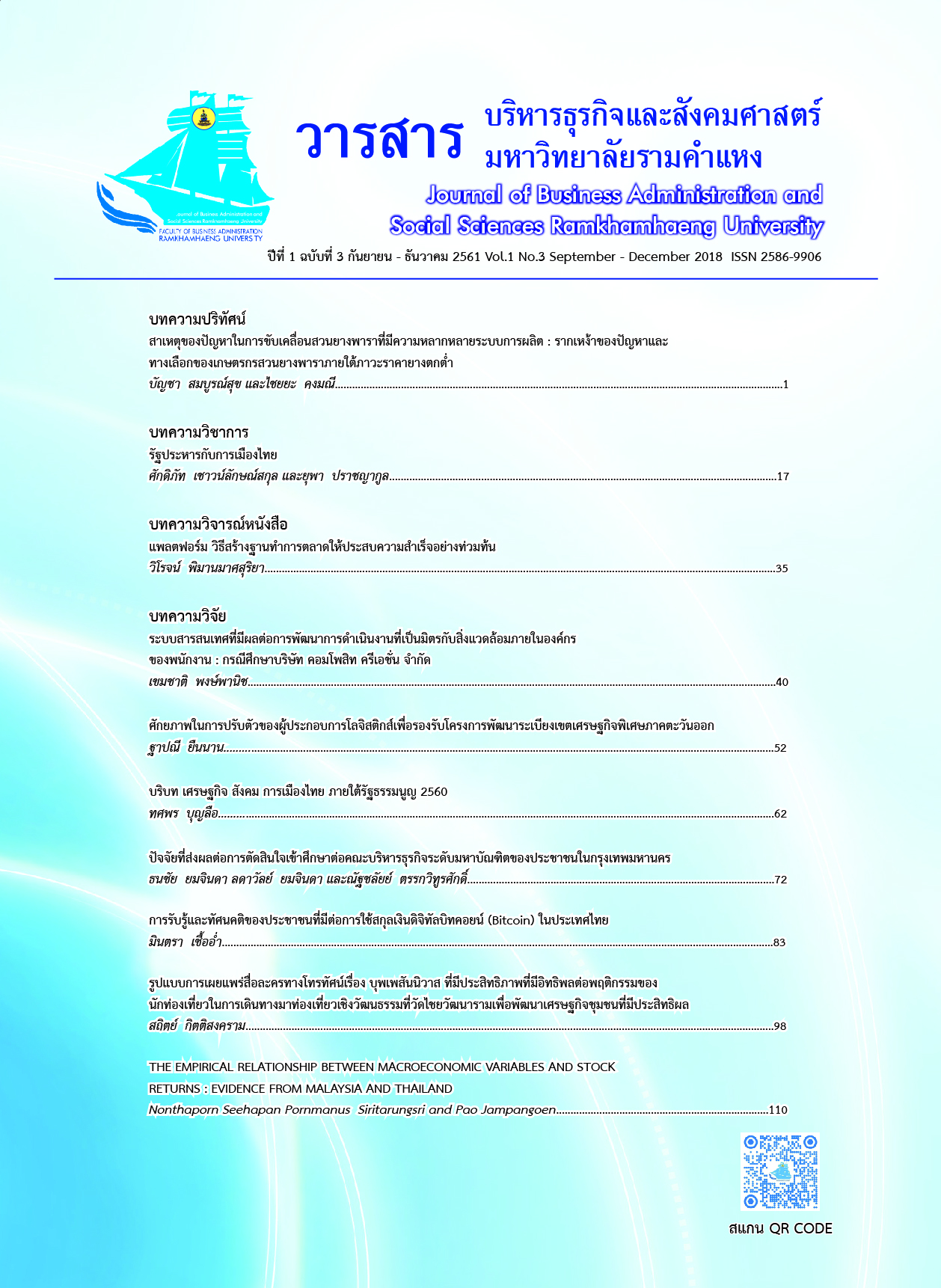THE TELEVISION DRAMA MEDIA BUPPESANNIVAS THAT EFFECTIVELY INFLUENCE THE BEHAVIOR OF TOURISTS IN CULTURAL TOURISM AT CHAIWATTHANARAM TEMPLE FOR EFFECTIVE COMMUNITY ECONOMIC DEVELOPMENT
Main Article Content
Abstract
This research study focused on the television drama media that effectively influence behavior in cultural tourism at Chaiwatthanaram temple for effective community economic development in the cultural center at Wat Chaiwatthanaram. Its purpose was to study the mode of broadcasting television drama effectively to develop an effective community economy and the perception model influencing behavior in traveling to Wat Chaiwatthanaram and to study the physical environment factors and the actors’ talent. The sample used in this study were 400 tourists who came to visit Wat Chaiwatthanaram. The independent variables were personal factors, such as gender, age, education level, occupation, income, marital status, and other variables, including the type of broadcasting, effective television drama and behavioral tourists at Wat Chaiwatthanaram and the dependent variable was the developing of a community economy. A questionnaire was used as a research tool. The statistics used to analyze the data were percentage, mean, standard deviation, and hypothesis analysis by t-test and one-way ANOVA. It was found in the analysis of demographic factors that most of the sample were female (61%), from 30-39 years old (32%), were of single marital status (50%), had gained a bachelor’s degree (42%), were in private business (27%) and had a monthly income of between 10,000-20,000 baht (38.%). .Most of the sample watched 30-minute dramas (59%), the most common type of television drama was comedy (31%), weekly television is daily (39.80%), 85% of the sample watched television drama, favorite watched drama was Bhumibolen (91%), and the benefits gained from television drama were relaxation from work (26%). Secondly, the average score for developing a community at Wat Chaiwatthana was at the highest level. Finally, the factors affecting the behavior of the characters overall were at the highest level.
Article Details
เนื้อหาและข้อมูลในบทความที่ลงตีพิมพ์ในวารสารบริหารธุรกิจและสังคมศาสตร์ มหาวิทยาลัยรามคำแหง ถือเป็นข้อคิดเห็นและความรับผิดชอบของผู้เขียนบทความโดยตรง ซึ่งกองบรรณาธิการไม่จำเป็นต้องเห็นด้วย หรือร่วมรับผิดชอบใดๆ
บทความ ข้อมูล เนื้อหา รูปภาพ ฯลฯ ที่ได้รับการตีพิมพ์ในวารสารบริหารธุรกิจและสังคมศาสตร์ มหาวิทยาลัยรามคำแหง ถือเป็นลิขสิทธิ์ของวารสารบริหารธุรกิจและสังคมศาสตร์ มหาวิทยาลัยรามคำแหง หากบุคคลหรือหน่วยงานใดต้องการนำบทความทั้งหมดหรือส่วนหนึ่งส่วนใดไปเผยแพร่ต่อ หรือเพื่อกระทำการใดๆ จะต้องได้รับอนุญาตเป็นลายลักษณ์อักษรจากวารสารบริหารธุรกิจและสังคมศาสตร์ มหาวิทยาลัยรามคำแหง ก่อนเท่านั้น
References
กิติมา สุรสนธิ. (2546). ความรู้ทางการสื่อสาร. กรุงเทพฯ: โรงพิมพ์มหาวิทยาลัยธรรมศาสตร์.
ปรัชญา เปี่ยมการุณ. (2549). ปัจจัยที่มีผลต่อการตัดสินใจเลือกรับชมละครโทรทัศน์. รายงานโครงการเฉพาะบุคคลวารสารศาสตรมหาบัณฑิต, กรุงเทพฯ: มหาวิทยาลัยธรรมศาสตร์.
เมทินี ทองศรีเกตุ. (2556). พฤติกรรมการดูละครทางโทรทัศน์ของวัยรุ่นไทย. กรุงเทพฯ: มหาวิทยาลัยกรุงเทพ.
สาวิตรี สอสุวงศ์. (2552). ศึกษากระบวนการผลิตรายการตีสิบของสถานีโทรทัศน์ไทยทีวีสีช่อง 3. วิทยานิพนธ์ปริญญานิเทศศาสตร์มหาบัณฑิต, มหาวิทยาลัยธุรกิจบัณฑิตย์.
สำนักงานส่งเสริมและพัฒนานันทนาการ. (2550). ชีวิตกับนันทนาการ. สืบค้นเมื่อ 23 กรกฎาคม 2554, จาก http://www.brdp.osrd.go.th/forlive/index.htm
สุจิตรา พันธุวงษ์. (2546). พฤติกรรมการเปิดรับและความคิดเห็นของกลุ่มวัยรุ่น ที่มีต่อรายการโทรทัศน์ทางด้านเทคโนโลยีสารสนเทศ. วิทยานิพนธ์วารสารศาสตร์มหาบัณฑิต, มหาวิทยาลัยธรรมศาสตร์.
Kerjcie, R. V., & Morgan, D. W. (1970). อ้างอิงใน ธีรวุฒิ เอกะกุล. (2543). ระเบียบวิธีวิจัยทางพฤติกรรมศาสตร์และสังคมศาสตร์. อุบลราชธานี: สถาบันราชภัฎอุบลราชธานี.


